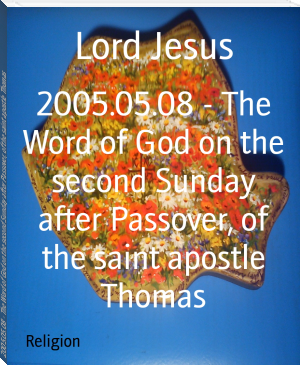The Story of a Soul, Saint Thérèse de Lisieux [android e book reader txt] 📗

- Author: Saint Thérèse de Lisieux
- Performer: -
Book online «The Story of a Soul, Saint Thérèse de Lisieux [android e book reader txt] 📗». Author Saint Thérèse de Lisieux
[1] 1 Kings 16:7.
[2] Tobias 12:7.
[3] Cf. Isaias 3:10.
[4] Prov. 9:4.
[5] Isa. 66:12, 13.
[6] Cf. Ps. 70[71]:17, 18.
[7] Soeur Thérèse had charge of the novices without being given the title of Novice Mistress.
[8] Ps. 118[119]:141.
[9] Ps. 118[119]:100, 105, 106.
[10] Luke 1:49.
[11] Cf. John 1:5.
[12] Cf. Luke 18:13.
[13] Ps. 91[92]:5.
[14] Ps. 143[144]:1, 2.
[15] Ps. 132[133]:1.
[16] Matt. 22:39.
[17] Cf. Matt. 7:21.
[18] Cf. John 13:34.
[19] John 15:12.
[20] Luke 11:33.
[21] John 15:12.
[22] 1 Cor. 4:3,4.
[23] Luke 6:37.
[24] Matt. 5:43, 44.
[25] Luke 6:32.
[26] Luke 6:30.
[27] Matt. 11:30.
[28] Matt. 5:40.
[29] Matt. 5:41.
[30] Matt. 5:42.
[31] Luke 6:34, 35.
[32] Prov. 1:27.
[33] Prov. 10:12.
[34] Ps. 118[119]:32.
______________________________
CHAPTER X THE NEW COMMANDMENTDear Mother, God in His infinite goodness has given me a clear insight into the deep mysteries of Charity. If I could but express what I know, you would hear a heavenly music; but alas! I can only stammer like a child, and if God's own words were not my support, I should be tempted to beg leave to hold my peace. When the Divine Master tells me to give to whosoever asks of me, and to let what is mine be taken without asking it again, it seems to me that He speaks not only of the goods of earth, but also of the goods of Heaven. Besides, neither one nor the other are really mine; I renounced the former by the vow of poverty, and the latter gifts are simply lent. If God withdraw them, I have no right to complain.
But our very own ideas, the fruit of our mind and heart, form a treasury on which none dare lay hands. For instance, if I reveal to a Sister some light given me in prayer, and she repeats it later on as though it were her own, it seems as though she appropriates what is mine. Or, if during recreation someone makes an apt and witty remark, which her neighbour repeats to the Community, without acknowledging whence it came, it is a sort of theft; and the person who originated the remark is naturally inclined to seize the first opportunity of delicately insinuating that her thoughts have been borrowed.
I could not so well explain all these weaknesses of human nature had I not experienced them. I should have preferred to indulge in the illusion that I was the only one who suffered thus, had you not bidden me advise the novices in their difficulties. I have learnt much in the discharge of this duty, and especially I feel bound to put in practice what I teach.
I can say with truth that by God's grace I am no more attached to the gifts of the intellect than to material things. If it happens that a thought of mine should please my Sisters, I find it quite easy to let them regard it as their own. My thoughts belong to the Holy Ghost. They are not mine. St. Paul assures us that without the Spirit of Love, we cannot call God our Father.[1]
And besides, though far from depreciating those beautiful thoughts which bring us nearer to God, I have long been of opinion that we must be careful not to over-estimate their worth. The highest inspirations are of no value without good works. It is true that others may derive much profit therefrom, if they are duly grateful to our Lord for allowing them to share in the abundance of one of His privileged souls; but should this privileged soul take pride in spiritual wealth, and imitate the Pharisee, she becomes like to a hostess dying of starvation at a well-spread table, while her guests enjoy the richest fare, and perhaps cast envious glances at the possessor of so many treasures.
Verily it is true that God alone can sound the heart. How short-sighted are His creatures! When they see a soul whose lights surpass their own, they conclude that the Divine Master loves them less. Since when has He lost the right to make use of one of His children, in order to supply the others with the nourishment they need? That right was not lost in the days of Pharaoh, for God said unto him: "And therefore have I raised thee, that I may show My power in thee, and My name may be spoken of throughout all the earth."[2]
Generations have passed away since the Most High spoke these words, and His ways have not changed. He has ever chosen human instruments for the accomplishment of His work.
If an artist's canvas could but think and speak, surely it would never complain of being touched and re-touched by the brush, nor would it feel envious thereof, knowing that all its beauty is due to the artist alone. So, too, the brush itself could not boast of the masterpiece it had helped to produce, for it must know that an artist is never at a loss; that difficulties do but stimulate him; and that at times it pleases him to make use of instruments the most unlikely and defective.
Dear Mother, I am the little brush that Jesus has chosen to paint His likeness in the souls you have confided to my care. Now an artist has several brushes—two at the least: the first, which is more useful, gives the ground tints and rapidly covers the whole canvas; the other, and smaller one, puts in the lesser touches. Mother, you represent the big brush which our Lord holds lovingly in His Hand when He wishes to do some great work in the souls of your children; and I am the little one He deigns to use afterwards, to fill in the minor details.
The first time the Divine Master took up His little brush was about December 8, 1892. I shall always remember that time as one of special grace.
When I entered the Carmel, I found in the noviciate a companion about eight years older than I was. In spite of this difference of age, we became the closest friends, and to encourage an affection which gave promise of fostering virtue we were allowed to converse together on spiritual subjects. My companion charmed me by her innocence and by her open and frank disposition, though I was surprised to find how her love for you differed from mine; and besides, I regretted many things in her behaviour. But God had already given me to understand that there are souls for whom in His Mercy He waits unweariedly, and to whom He gives His light by degrees; so I was very careful not to forestall Him.
One day when I was thinking over the permission we had to talk together, so that we might—as our holy constitutions tells us—incite ourselves more ardently to the love of our Divine Spouse, it came home to me sadly that our conversations did not attain the desired end; and I understood that either I must no longer fear to speak out, or else I must put an end to what was degenerating into mere worldly talk. I begged our Lord to inspire me with words, kind and convincing; or better still, to speak Himself for me. He heard my prayer, for those who look upon Him shall be enlightened,[3] and "to the upright a light is risen in the darkness."[4] The first of these texts I apply to myself, the other to my companion, who was truly upright in heart.
The next time we met, the poor little Sister saw at once that my manner had changed, and, blushing deeply, she sat down beside me. I pressed her to my heart, and told her gently what was in my mind; then I pointed out to her in what true love consists, and proved that in loving her Prioress with such natural affection she was in reality loving herself. I confided to her the sacrifices of this kind which I had been obliged to make at the beginning of my religious life, and before long her tears were mingled with mine. She admitted very humbly that she was in the wrong and that I was right, and, begging me as a favour always to point out her faults, she promised to begin a new life. From this time our love for one another became truly spiritual; in us were fulfilled these words of the Holy Ghost: "A brother that is helped by his brother is like a strong city."[5]
Dear Mother, you know very well that it was not my wish to turn my companion away from you, I only wanted her to grasp that true love feeds on sacrifice, and that in proportion as our souls renounce natural enjoyments our affections become stronger and more detached.
I remember that when I was a postulant I was sometimes so violently tempted to seek my own satisfaction by having a word with you, that I was obliged to hurry past your cell and hold on to the banisters to keep myself from turning back. Numerous permissions I wanted to ask, and a hundred pretexts for yielding to my desires suggested themselves, but now I am truly glad that I did not listen. I already enjoy the reward promised to those who fight bravely. I no longer feel the need of refusing myself these consolations, for my heart is fixed on God. Because it has loved Him only, it has grown, little by little, and now it can give to those who are dear to Him a far deeper and truer love than if it were centred in a barren and selfish affection.
I have told you of the first piece of work which you accomplished together with Our Lord by means of the little brush, but that was only the prelude to the masterpiece which was afterwards to be painted. From the moment I entered the sanctuary of souls, I saw at a glance that the task was beyond my strength. Throwing myself without delay into Our Lord's Arms, I imitated those tiny children, who, when they are frightened, hide their faces on their father's shoulder, and I said:
"Dear Lord, Thou seest that I am too small to feed these little ones, but if through me Thou wilt give to each what is suitable, then fill my hands, and without leaving the shelter of Thine Arms, or even turning away, I will distribute Thy treasures to the souls who come to me asking for food. Should they find it to their taste, I shall know that this is due not to me, but to Thee; and if, on the contrary, they find fault with its bitterness, I shall not be cast down, but try to persuade them that it cometh from Thee, while taking good care to make no change in it."
The knowledge that it was impossible to do anything of myself rendered my task easier. My one interior occupation was to unite myself more and more closely to God, knowing that the rest would be given to me over and above. And indeed my hope has never been deceived; I have always found my hands filled when sustenance was needed for the souls of my Sisters. But had I done otherwise, and relied on my own strength, I should very soon have been forced to abandon my task.
From afar it seems so easy to do good to souls, to teach them to love God more, and to model them according to one's own ideas. But, when we draw nearer, we quickly feel that without God's help this is quite as impossible as to bring back the sun when once it has set. We must forget ourselves, and put aside our tastes and ideas, and guide souls not by our own way, but along the path which Our Lord points out. Even





Comments (0)